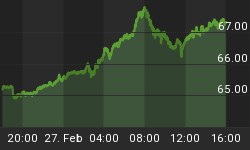One would think that an average P/E of 20 on properly accounted for earnings (including stock options and pension adjustments) would weigh on the market. Likewise, the combination of higher gasoline prices, soaring heating and electricity bills, and rapidly rising rates on the short end of the curve should dampen consumer spending as we now know that Americans saved no money last month (the worst showing since after the Great Depression) and are the most behind on credit card payments (4.81% 30+ days delinquent) in the 32 or so years that they have been keeping data. It seems that Americans' "spend and then spend some more" lifestyle that has become customary may (hopefully) be finally coming to a head as it has reached such extremes that the market will eventually force individuals to repair their balance sheets. The marginal U.S. consumer is, in our opinion, in deep trouble.
Anecdotal signs such as the sudden slowdown in Manhattan apartment prices, which posted a 13% decline sequentially from Q2 to Q3, are the worst showing since 1989's 24% drop that kicked off a six year slide in the Big Apple's real estate market. Despite the sequential Q3 drop, Manhattan apartment prices are still up year-over-year. The number of apartments in Manhattan on the market rose 16% to 5,764 and it took an average of 133 days to sell a unit versus 102 days in the second quarter. Nationally, rising home inventories seem to be setting us up for the housing accident that we have all been waiting for, especially on both coasts. Is it any wonder that housing stocks have acted like death lately? The auto sector is again in total disarray as September car sales were down 20% year-over-year for Ford and 24% for GM. Keep in mind that "employee pricing" was still in effect in September, so the slowdown in October as employee pricing ends may be all the more breathtaking.
You would figure with all this bad news, the public would have discovered the one asset that has held up in the face of the storm - gold. But alas, we are still in the early stages of the gold bull market, as 99% of the general public has no idea what has been happening with the yellow metal. Perhaps a push through $500/oz will attract some small amount of attention, but we expect this stealth bull market to continue for quite a while. Oil & natural gas have been attracting the attention of the masses, which makes sense as these two commodities impact our day-to-day lives more than any other natural resource. But once the economy breaks, attention will shift to the viability of the financial system - and gold bullion is the ultimate safe haven for any systemic shocks the economy may suffer.















